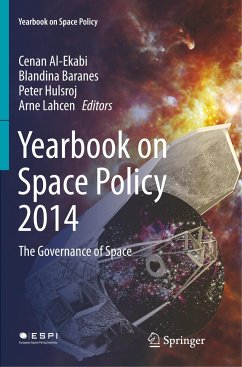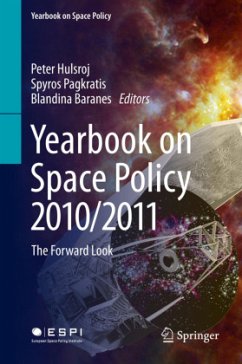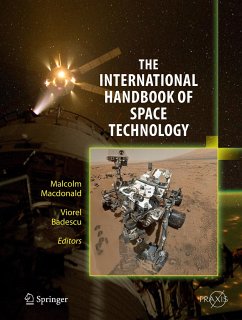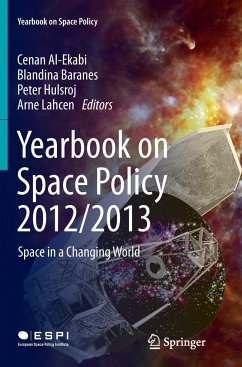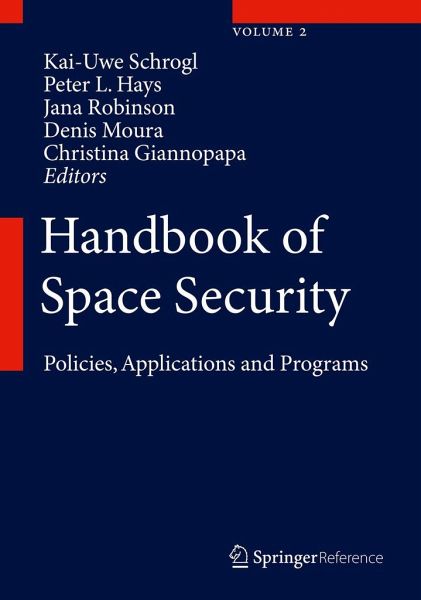
Handbook of Space Security, Volume 1
Policies, Applications and Programs
Herausgegeben: Schrogl, Kai-Uwe; Hays, Peter L.; Robinson, Jana; Moura, Denis; Giannopapa, Christina
Versandkostenfrei!
Versandfertig in über 4 Wochen
602,99 €
inkl. MwSt.

PAYBACK Punkte
301 °P sammeln!
Space Security involves the use of space (in particular communication, navigation, earth observation, and electronic intelligence satellites) for military and security purposes on earth and also the maintenance of space (in particular the earth orbits) as safe and secure areas for conducting peaceful activities. The two aspects can be summarized as "space for security on earth" and "the safeguarding of space for peaceful endeavors."The Handbook will provide a sophisticated, cutting-edge resource on the space security policy portfolio and the associated assets, assisting fellow members of the g...
Space Security involves the use of space (in particular communication, navigation, earth observation, and electronic intelligence satellites) for military and security purposes on earth and also the maintenance of space (in particular the earth orbits) as safe and secure areas for conducting peaceful activities. The two aspects can be summarized as "space for security on earth" and "the safeguarding of space for peaceful endeavors."
The Handbook will provide a sophisticated, cutting-edge resource on the space security policy portfolio and the associated assets, assisting fellow members of the global space community and other interested policy-making and academic audiences in keeping abreast of the current and future directions of this vital dimension of international space policy. The debate on coordinated space security measures, including relevant 'Transparency and Confidence-Building Measures,' remains at a relatively early stage of development. The book offers a comprehensive description of the various components of space security and how these challenges are being addressed today. It will also provide a number of recommendations concerning how best to advance this space policy area, given the often competing objectives of the world's major space-faring nations. The critical role to be played by the United States and Europe as an intermediary and "middle diplomat" in promoting sustainable norms of behavior for space will likewise be highlighted.
In providing a global and coherent analytical approach to space security today, the Handbook focuses on four areas that together define the entire space security area: policies, technologies, applications, and programs. This structure will assure the overall view of the subject from its political to its technical aspects. Internationally recognized experts in each of the above fields contribute, with their analytical synthesis assured by the section editors.
The Handbook will provide a sophisticated, cutting-edge resource on the space security policy portfolio and the associated assets, assisting fellow members of the global space community and other interested policy-making and academic audiences in keeping abreast of the current and future directions of this vital dimension of international space policy. The debate on coordinated space security measures, including relevant 'Transparency and Confidence-Building Measures,' remains at a relatively early stage of development. The book offers a comprehensive description of the various components of space security and how these challenges are being addressed today. It will also provide a number of recommendations concerning how best to advance this space policy area, given the often competing objectives of the world's major space-faring nations. The critical role to be played by the United States and Europe as an intermediary and "middle diplomat" in promoting sustainable norms of behavior for space will likewise be highlighted.
In providing a global and coherent analytical approach to space security today, the Handbook focuses on four areas that together define the entire space security area: policies, technologies, applications, and programs. This structure will assure the overall view of the subject from its political to its technical aspects. Internationally recognized experts in each of the above fields contribute, with their analytical synthesis assured by the section editors.








